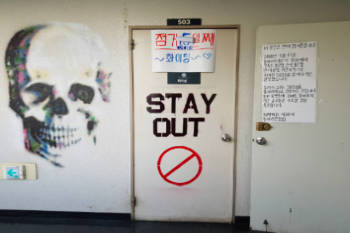
From Sept. 17, the 34th Ewha’s Club Foundation has been occupying Room 503 in the Student Union Building. The Club Foundation has been asking the Office of Student Affairs (OSA) to change the room into a central clubs’ office, to meet its demands that more space be provided for clubs. Room 503 is currently a rarely-used conference room for the OSA.
The Club Foundation occupied Room 503 and is showing movies at 8 p.m. in the room every day to encourage students to sign its petition calling for more space. The Club Foundation insists that Ewha’s current room allocation system is problematic and is asking the OSA to find a solution.
Central clubs are official clubs recognized by the school, and are funded and provided with an office, in principle. However, 14 out of all Ewha’s central clubs do not have their own offices in the Student Union Building. The Club Foundation says that clubs’ basic activities are restricted when they don’t have their own space. For example, club members have nowhere to host contests and events and cannot even store equipment for their activities. Since clubs’ offices have to be available for students’ extracurricular activities outside of office hours, they are best located in the Student Union Building, which is accessible for 24 hours.
“As the name suggests, the Student Union Building was built as an independent space for students,” said Kim Hye-rin, a representative of the Club Foundation in 2017. “We believe that the fundamental problem in this issue is that the school doesn’t consider students’ independent space when they construct new buildings. The school is building more buildings, however, the space for students remains insufficient.”
Kim claimed that, though students have the right to their own space, the school only allocates space for students when it is “left over”. She insisted that it is important for the school to make room for students rather than focusing solely on accommodating school operations.
However, the OSA said that allocating rooms in that way would be “unfair.”
“When we allocate rooms for students’ activities, the school must consider communal space that can benefit every student, rather than particular club members,” said Oh Eun-jung, who is in charge of press and public relations in the OSA. “Allocating a room is a very serious and sensitive topic, not only for students but for all Ewha members.”
Oh further explained that, as well as central clubs and the student council, the offices related to students’ activities such as Student Services and Student Counseling co-exist in the Student Union Building.
“Room 503 is a conference room for the OSA. A lot of important issues including evaluations for scholarships are dealt within that room,” Oh commented. “If we allocate room 503 for the central clubs without any alternative space for us, our work, which covers all students, would be disrupted.”
The OSA claimed that the Club Foundation had approved more central clubs even when they knew that sufficient support for new clubs was impossible. Oh said that these additional approvals were the main reason for the central clubs’ lack of space.
“It is impossible to provide new space in proportion to constantly increasing new central clubs while space is limited,” Oh said.
The Club Foundation and the OSA met on Oct. 8 to discuss this issue. The two bodies are scheduled to meet once again in late October.

